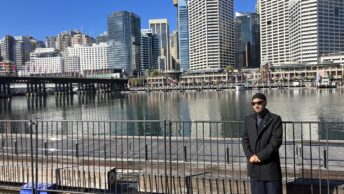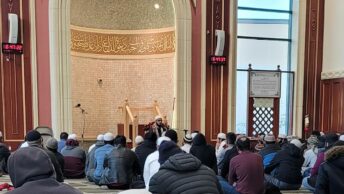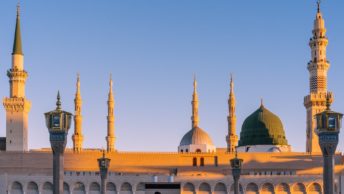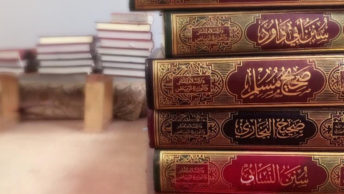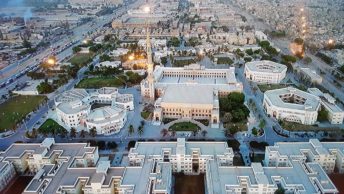From childhood, a day that almost all of us dread is the day when one of our parents leave this mortal world and move on to the eternal life of the hereafter. We hear about the passing of our friends’ parents and wonder how they must be feeling, but it is virtually impossible to understand the emotion until one does not undergo the experience him or herself. Parents are everything for children and, unfortunately, many of us fail to value them properly until the blessing is taken away from us. As I sit to write these few lines, my mind is filled with emotion, thoughts, stories and a lifetime of memories with “bāji” (as he was affectionately known within our family, which probably is an abbreviation of “abbaji”, i.e. dear father); yet, I am struggling to translate them into writing. I have never experienced writing any article or post as testing/challenging as relating the apparent and simple truth that my dear and beloved father, the teacher and guide of thousands of students, Shaykh al-Hadith Mawlana Adam Sahib, has embarked on his final journey – one that each and every person on earth, sooner or later, willingly or unwillingly, is compelled to make. إِنَّـا لِـلَّـهِ وَ إِنَّـا إِلَـیْـهِ رَاجِـعُـونَ
The heart has never felt pain with any incident or event in life like the pain being felt currently in accepting the reality that the illuminated face we would go and visit every day after a hard day of work has hidden itself for the remainder of this life. The affectionate voice, through which every difficulty turned into ease, will no longer be heard. Even a hard-hearted person like me, who seldom cries, is unable to hold back his tears. I read the words “grief”, “sadness” and “heartache”, but only today have I actually understood their true meanings. Ah! Who will now constantly ask: “have you eaten?”, “do you need money?”, “make sure to wrap yourself in the cold weather.” O Lord, what type of test is this, what kind of grief is this. It is only You who will grant patience (sabr); there is no one besides You who is able to grant contentment. اللهم لا ملجأ ولا منجأ إلا إليك
However, we accept the Decree of Allah. He is the Sovereign and All-Wise. As my respected and beloved teacher, Shaykh Mufti Muhammad Taqi Usmani (may Allah protect him), once said: “In times of difficulty and grief, meditation of Allah Most High being Hākim/حاكم (Absolute Sovereign Ruler & Decision-maker) and Hakīm/حكيم (Absolutely Wise in whatever He decides for us) helps in attaining patience (sabr).” Every human being comes into this world to die. No one has lived or will live here forever. If this temporary abode needed anyone to live forever, then it is the Prophets of Allah (peace and blessings be upon them). If anyone deserved to live here forever, it would have been our beloved Messenger (Allah bless him & grant him peace); yet, he also departed this mortal abode after completing his duties. Thus, the incident of my father’s passing was inevitable and had to occur at some point. However, in order to lighten the pain for us, Allah the Most-Merciful granted us so many positive points:
How many people experience their parents passing away during their childhood or when they are young? However, Allah Most High took him away when the youngest of his children is in his forties. My father not only saw his many grandchildren but also great grandchildren. Despite spending around 86 years (89 years Islamically) in this world, he remained predominantly healthy and functional. He only became somewhat disabled during the final year of his life. He visited Madina Tayyiba a few days prior to his passing and was able to pray in the Prophet’s Mosque and offer his salām to him (peace and blessings be upon him). He had his family (wife, all his children and grandchildren), as well as close students and devotees, constantly around him during his days of illness up to his passing. His illness and gradual deterioration allowed his family members and well-wishers to be mentally prepared for his departure. As news broke that he underwent a severe stroke and doctors had given him a few days to live, people from all around Leicester and beyond flocked to his house in order to just get a glimpse of him and pray for him. In just one day, approximately two to three thousand people visited him to the point that visitation had to be stopped upon the direction of the doctors. Thus, despite it being an extremely sad incident, there are also positives which can be considered, and this should help in attaining sabr, by the Will of Allah.
My dear father was a man of unusual qualities, a scholar of great merit, and a saint of high rank. Born in Manekpore (Gujarat, India) on 26 Sha’ban 1356 AH / 31 October 1937 AD, his beloved mother passed away when he was only around 11 years of age. He memorised the Qur’an at a young age and thereafter studied the initial years of the dars nizāmi/alimiyya course in Gujarat. He later enrolled into the famous Dar al-Ulum Deoband seminary and graduated from there in 1961. He studied under the likes of Shaykh Mawlana Qari Muhammad Tayyib (d. 1983; the longest serving rector of Dār al-Ulum Deoband), Shaykh Sayyid Fakhr al-Din al-Muradabadi (d. 1972; the student of Shaykh al-Hind Mawlana Mahmud al-Hasan and Imam Anwar Shah Kashmiri, with whom my father studied Sahih al-Bukhari), Shaykh al-Allama Ibrahim al-Balyāwi (d. 1967; student of Shaykh al-Hind Mawlana Mahmud al-Hasan and grand student of Shaykh Rashid Ahmad Gangohi, who taught approximately three generations of scholars), and others. He also saw and benefited from the likes of Shaykh al-Islam Mawlana Husayn Ahmad Madani (d. 1957), Shaykh Mufti Muhammad Shafi’ (d. 1976) and Shaykh al-Hadith Muhammad Zakariyya al-Kandahlawi (d. 1982). In the science of tazkiya/tasawwuf, his first shaykh was Shaykh Mawlana WasiAllah Ilahabadi (d. 1964; a foremost disciple of Hakim al-Umma Mawlana Ashraf Ali Thanawi). He later benefitted from Shaykh Mawlana In’ām al-Hasan Kandahlawi (d. 1995) and Shaykh Mufti Mahmud al-Hasan Gangohi (d. 1997). The late Shaykh Muhammad Yusuf Mutala (d. 2019) also granted him permission. There are very few people, if any, alive today who have seen or benefited from the likes of these scholars, may Allah have mercy on all of them. Scholars such as Shaykh Mufti Sa’id Palanpuri and Shaykh Mawlana Arshad Madani are my father’s student day colleagues. My father’s hadith chain is deemed one of the highest in our times (there is only one link between him and Shaykh al-Hind Mawlana Mahmud al-Hasan) and, thus, many ulama and tullab often visited him and sought permission (ijazah) in hadith from him
After completing his studies, he remained in India. In 1964, he took up a teaching post at the famous Jami’ah Islamiyya Ta’lim al-Din Seminary, located in Dabhel (Gujarat). The seminary is considered the third most renowned and prestigious centre of Islamic learning in India, after the Dar al-Ulum in Deoband and Mazahir al-Ulum in Saharanpur. Great luminaries such as Imam Anwar Shah Kashmiri, Shaykh Allama Shabbir Ahmad Uthmani and Shaykh Muhammad Yusuf Binnori (may Allah have mercy on them) taught at the seminary. My father was an expert of Persian literature and, thus, he was initially appointed a teacher of Persian language. Later, he taught books in other Islamic disciplines such as Sharh al-Aqa’id and Nur al-Anwār. Many scholars (some of whom have passed away, and others who have become elderly) studied by him at this seminary.
Whilst he was teaching at the above seminary, he was invited by Muslims residing in Malawi (south-eastern Africa) to come and serve their local community. After consulting his teachers, he – along with his family – relocated to this south-east African country. He served as an imam and teacher for approximately seven years, initially in Limbe and later in Mangochi (a township in the southern region of Malawi). Thousands of local Muslims – predominately those hailing from the subcontinent – benefited from him during his stay there. His Urdu lectures had a lasting impact on the people and he led them in prayers and taught their children Qur’an and basic Islamic knowledge. He established a Qur’an school and madrasa, giving many young children an opportunity to memorize the Book of Allah. To this very day, those who prayed behind him in Malawi, attended his talks, or studied by him, all remember him fondly and are eternally grateful to him. So much so, many families became so attached to him that they followed him to the UK.
In November 1975, my beloved father moved from Malawi to the city of Leicester in the UK. This move became the catalyst for the then 38-year-old to singlehandedly shape the Islamic vision of Leicester and beyond. He was initially appointed an imam at Masjid al-Nur in the Highfields neighbourhood of Leicester. He then, in 1977, established the Jame’ Masjid/Mosque and madrasa, and served the local community and the din of Allah for almost five decades with absolute sincerity, integrity, dedication and steadfastness (istiqama). At a time where people move onto bigger and better “job” offers, my father remained attached to one masjid for approximately 48 years. I personally do not know of any other example of such long khidma/service at one masjid. In the early days, he was the sole imam, leading all five prayers. He would often walk to the masjid and, during the winter when prayer times are close to each other, remain from Zuhr till Eisha at the masjid. I heard him once say that in the initial days, at times no one would join him for Fajr prayers, and only a handful would attend the other prayers. He would proclaim the adhan and lead the prayer himself. Today, hundreds and thousands of worshippers attend daily prayers and Jumu’ah. He never once asked for or even suggested a pay rise, and would often say that whatever Allah grants, it is enough for us and there are blessings (baraka) in it.
He purchased a small house across the masjid and lived there all his life, till his final moments. People often have a habit of climbing the housing ladder, but my father was content with his small house. Had he wanted, he could have earned more money and purchased a larger property, or a second house. However, he was absolutely content with his house (which in 1977 was purchased for a mere £4000). He was at peace with his life. Money and large properties do not bring happiness into one’s life; happiness is a gift granted by Allah to His beloved servants. His entire life was basically from his house to the masjid, and back to the house. He hardly visited people’s houses for socializing or shopping centres; he kept himself to himself. He was adorned with the quality of humility, and had no interest in name or fame. At the same time, he engaged with the community and welcomed everyone. People from all over the city and beyond – even non-Muslims, on occasions – would come to him for advice and du’a. He was disciplined and never wasted his time, yet he served the people with dedication. He never used a PC, laptop or smart phone all his life; in fact, he did not even know how to use a smart phone. He just about managed to navigate an old Nokia phone to make important phone calls. We never had a TV in our house, and my father was very strict with images being brought into the house. As soon as some junk mail was posted through the letter box with images, my father was very quick to throw it away in the garbage bin. He was very principled at home, yet very loving, with Islamic values and ethics.
At the masjid/mosque, he shaped the mind and vision of the local community via his Jumu’a lectures, as well as other discourses. He conducted Qur’an Tafsir lessons during the week, completing the entire Qur’an in approximately 20 years. He also conducted hadith and tazkiya lessons for the public. The lives of thousands of people changed through his discourses and teachings. When my parents first moved to the UK, my dear mother (may Allah protect her) was probably the only female to dress in full Islamic dress code in the city. Today, thousands of females throughout the city are seen in hijab, jilbab and niqab. His Jumu’ah lectures were fiery and to-the-point in his early days, but he mellowed down towards the latter part of his life. He was regularly invited to other cities, and sometimes abroad, to deliver talks. It is difficult to even enumerate how many people and families he impacted positively, and it is for this reason that when news spread of his extreme ill health, thousands poured in to just have a glimpse of him.
He also established a children’s madrasa/maktab, known as Jami’ah Ulum al-Qur’an. Thousands of young boys and girls have studied here over the past five decades, with two to three generations of a single family benefitting from the madrasa. Approximately 1500 children were studying at once, during many stages of its operation. Later, other mosques were established in Leicester by people who first prayed at the Jame’ Mosque and then moved to different areas of the city. Many of us in our middle age grew up around Jame’ Mosque and knew only one imam/scholar. People in the early years knew my father as “Molsab (Molvi Sahib) Adam” or “Mawlana Adam”. Later, people referred to him as “Hadhrat.” In early 2000s, a full time dars nizami/alimiyya programme was initiated at the madrasa for both males and females. Hundreds of students have graduated as scholars and are now serving the communities in a variety of ways. He taught Sahih al-Bukhari for many years at the madrasa. A boys and girls Islamic school was also established. The entire Jame’ Mosque/Masjid area is like a small Islamic quarter, with various facilities on offer. The pathway outside the mosque was renamed “Jame’ Walk”, and a few years ago the local council named the entire square as “Shaykh Adam Square” – owing to his lifelong services to the local community. My father was also a shaykh of tasawwuf/tazkiya. Thousands of people benefitted from him in this science and bettered their lives. He would conduct a weekly spiritual reformation gathering (islahi majlis) which was attended by many of his students and devotees. They all loved him dearly and listened attentively to every word he spoke.
My father did not take up any other job, despite having time on his hands in those initial years. He was happy with his sufficient income and dedicated his time to reading and worship (ibadah). In between prayer times and teaching at the madrasa, he was always at home and spent the majority of his time reciting Qur’an and engaging in other acts of worship. The melodious voice of him reciting the Book of Allah is still ringing in my ears today. As a child and teenage boy sleeping in my bedroom, the sound I heard most was of my father reciting juz’ after juz’ from the Qur’an, or reciting salawat and other litanies and supplications. Basically, his time at home – for years on end – would be spent in worshipping Allah. He was very punctual with his five daily prayers, hardly ever missing the initiating takbir (takbir al-tahrima) at the mosque. I cannot remember him missing a single prayer at the mosque for decades on end, until he became very ill and somewhat disabled during his last few years. He would perform his salah with ultimate devotion, concentration and calmness, to the point that even during his final few years when he became somewhat disabled, he would pray standing up, executing ruku’ and sujud despite experiencing pain and hardship.
He was very particular with his monetary dealings. To my knowledge, he seldom took loans from people. In fact, he helped others who faced financial difficulties. His precaution with waqf funds was exemplary. If he ever went to the mosque/madrasa for his own need, he would pay some money into a mosque money box which he had kept in his office for this purpose. I remember him regularly paying 50 pence or a pound, back in the day, for utilizing the masjid light for a few minutes. He was adorned with the quality of istighna’, that is having no interest in the wealth of others. He stayed far away from public relations and striking up strategic friendships with others for ulterior motives. He was sincere in his relationship and dealings with others. I remember, during childhood, that he would prevent us from buying our groceries from a local Muslim grocery because he knew that a discount would be given. This is termed “ishraf al-nafs”, he would say, and it is impermissible and blameworthy. He adopted the way of Hakim al-Umma Shaykh Mawlana Ashraf Ali Thanawi (may Allah have mercy on him) in this regard. In fact, he was an avid lover of Mawlana Thanawi and would constantly study his works.
My father was also very precautious in his practice of Islamic guidelines, aiming always for the superior and staying far away from disliked and even doubtful matters. He was an avid follower of the Sunna. For him, it was like a sin to sleep with his legs stretched towards the qibla, for example, or wear his clothes or footgear starting with the left arm or foot. When he suffered his first stroke on his left arm, the medics advised to make him wear his upper garment by putting the left hand/arm into the sleeve first. However, he was adamant that his right arm should be put into the sleeve first. He only agreed after a lot of convincing. His level of taqwa was exemplary. Due to this, despite being an imam in the community for almost five decades, no one could ever point a finger at him. He never gave anyone the opportunity to talk about him negatively, since he always remained levels above what was permitted. People respected him, were in awe of him, and loved him dearly. He won the hearts and minds of the people, and people often mentioned his piety, taqwa and discipline. He was an avid lover of the Messenger of Allah (peace and blessings be upon him) and constantly engaged in reciting abundance salawat upon him. The Poem of the Cloak (qasida al-burda) was his favourite poetry, and he would normally commence his talks and discourses by reciting a few couplets from it.
My father was a great family man. His relationship with my mother was unique and based on mutual love and respect. My mother dedicated her life to him, serving him and looking after him in all his affairs. He, in turn, showered her with affection and could not tolerate being without her. He never travelled anywhere without her, and only enjoyed her cooking. He had time for all his children and grandchildren, regularly asking about their wellbeing. He had a habit of gifting money to his children and grandchildren. He loved all his children and grandchildren dearly. Being his youngest child, he treated me like a child even till now. Whenever I entered his house, he would tell my mother to feed me, give me some fruit or food to eat. In fact, his final conversation with me was asking me if I ate and telling my mother to give me some soup.
He suffered a stroke in February 2023, affecting his left arm, and became bedridden at home. Despite being bedridden and suffering pain, he never complained and was content with the Decree of Allah. He would constantly recite the following du’a during his illness: “O Allah, make me content with your Decree.” Al-hamdulillah, a lot of people took care of him during the course of the year. He then travelled to India with my mother, elder brother, and a couple of his students. He fell ill in India and was hospitalized. After being released from hospital and spending a few days in India, he travelled to Madina al-Munawwara. The majority of our family members, including myself, joined him in Madina. He was very emotional during his stay in the city of the Prophet (peace and blessings be upon him). He then returned to the UK and was once again hospitalized. Upon release, he suffered a severe brain stroke which eventually proved to be fatal.
He spent the last few days of his life at home with all his family members and close students/associates around him. Today it seems that the entire city of Leicester is mourning. Everyone is consoling everyone else. So many people have been affected by his demise. Indeed the city of Leicester, in particular, and the UK, in general, has lost a father-figure, imam, shaykh, spiritual guide, and mentor. The fact is that for many people, my father was a shaykh, imam, teacher and guide; and for me, he was a loving father who treated me like a child up until his demise. I can’t, and will never, forget his love and affection towards me. He has left behind thousands of students and devotees. All his children and the majority of his grandchildren are huffaz and graduate scholars. May Allah forgive his shortcomings, elevate his status, give him the best of rewards in the hereafter and grant him eternal bliss. I bid you farewell, O my beloved father, till we meet again in paradise. Allahumma Amin.
Muhammad ibn (Shaykh Mawlana) Adam
Leicester, UK
07/03/2014

